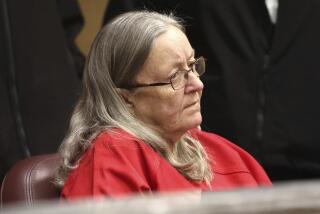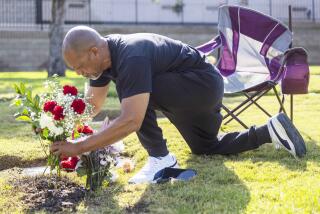Man Tells of Accused Wife’s ‘Bad Feelings’ About Baby
- Share via
Through the first six years of their marriage, Jeffrey and Tani McCollough believed they’d never be able to have children. And then, unexpectedly--almost miraculously--she became pregnant.
But, according to testimony Friday in Los Angeles Municipal Court, the couple’s joy at starting a family was eclipsed by her overwhelming anxiety that she would fail as a mother. The fear began when she was pregnant and continued after the birth.
In the end, Deputy Dist. Atty. Karen L. Tandler alleges, Tani McCollough’s worst fears became a self-fulfilling prophecy.
On Nov. 23, 1994--10 days after she gave birth--the nervous new mother allegedly smothered her baby, Colin, and hurled herself from an overpass onto the Ventura Freeway.
An elfin 31-year-old who appears half her age and walks stiffly from the injuries she suffered in the fall, McCollough was charged this month with murdering her infant son.
But Friday’s testimony indicated that the cause of the baby’s death remains a mystery. Los Angeles County Coroner Lakshmanan Sathyavagiswaran testified that he could not rule out two causes of death: suffocation, which would be homicide, and sudden infant death syndrome, which would be a natural cause.
Because the autopsy failed to determine exactly what caused Colin’s death, Jeffrey McCollough is the most crucial--and reluctant--prosecution witness against his wife.
Details of the family tragedy began to unfold Friday at a preliminary hearing before Judge Kathleen Kennedy-Powell. The source of most of those details was McCollough, first through his statements to police and then through his own words on the witness stand.
It was McCollough who discovered his wife missing that morning, after his son had turned cold and blue in his cradle in the family’s two-bedroom apartment in Burbank. He dialed 911, and tried to resuscitate the infant--as he’d learned in a class he took with his wife.
Later, in a waiting room at St. Joseph Medical Center, Jeffrey McCollough talked to Officer Reeve Rickard, the officer testified.
At the time, McCollough knew only that his son wasn’t breathing and his wife was missing. But, the officer testified, he already was piecing together the clues.
“If she did this, I hope she dies,” McCollough blurted, according to Rickard’s testimony.
McCollough also told Rickard about a disturbing conversation he’d had with his wife two days earlier, after coming home from work and finding her “with that look in her eye.”
The officer related McCollough’s story as follows: McCollough asked her what was the matter. She refused to answer, explaining, “I can’t tell you. You’ll hate me.”
After McCollough prodded further, she confessed, “I’ve had bad feelings about the baby. I’ve thought about smothering the baby and then killing myself.”
On the witness stand, McCollough contradicted the officer, recalling that the conversation with Rickard occurred en route to the hospital. He said he couldn’t be sure of dates or what exactly had been said.
McCollough reluctantly became a key prosecution witness against his wife after receiving a grant of immunity from prosecutors.
Prosecutor Tandler said McCollough earlier had waived spousal immunity--a legal protection against testifying against his wife--when he spoke freely with Rickard and other Burbank police officers on the day his son died.
As he took the witness stand, McCollough glanced toward his wife and smiled as he recalled the date of their seventh wedding anniversary--May 14. But, his memory was less exact when Tandler pressed him on details of statements he had given police.
He testified that a day or two before the baby died, he found his wife crying in the kitchen. He recalled she said she was having “bad feelings” about herself and the baby, that she could “see herself doing things.” Pressed for details, he testified she “might have” mentioned thinking about suffocating the baby by cupping her hand over his nose and mouth.
Tani McCollough’s “bad feelings” scared the couple so much, they sought help from a therapist during her pregnancy, he testified. The therapist diagnosed her as a dependent personality more likely to abandon the baby than to kill him, police testified.
But the couple believed Tani might benefit from medication to help her with her depression and suicidal thoughts. She had an appointment to see a psychiatrist the week after Colin’s death, according to testimony.
By then, it was too late. Instead, she was hospitalized for a fractured skull, neck and wrist after leaping, moments after the baby’s death, from the Hollywood Way overpass onto the Ventura Freeway.
Testimony resumes Monday.
More to Read
Sign up for Essential California
The most important California stories and recommendations in your inbox every morning.
You may occasionally receive promotional content from the Los Angeles Times.













